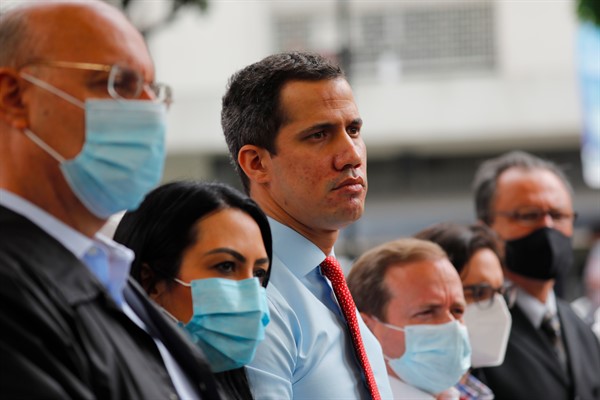The emergence of a dynamic young leader galvanized the Venezuelan opposition two years ago. Juan Guaido united disparate opposition parties and won recognition as the country’s legitimate president from Donald Trump’s administration and dozens of other governments. His colleagues and the U.S. officials who backed him insisted that a campaign of “maximum pressure”—entailing biting sanctions, international isolation and even veiled threats of military action—would force an end to President Nicolas Maduro’s “usurpation” of power and restore democracy to Venezuela.
That was a miscalculation. Maduro, who cleaned up in elections last December that the opposition called a sham, looks more entrenched than ever. The opposition’s unrealistic appraisal of its own strength led it over a cliff. “Maximum pressure” failed, and Guaido’s strategy is on the rocks. Support for his “interim presidency” was already ebbing last year. Now, the parliamentary majority that was the basis for Guaido’s claim to power as the president of the National Assembly has expired, with 90 percent of seats controlled by Maduro allies after the opposition boycotted December’s polls. Still, opposition legislators, amid some internal dissent, insist that Guaido remains Venezuela’s legitimate president. They have endorsed a rump parliament, known as the Delegate Commission, and invented a “Political Council”—yet to be set up—that would, in theory, rejuvenate the wilting unity and fading promise of the opposition forces.
Those claims have resonated little among the opposition’s international backers. Barely a handful of the nearly 60 governments that previously recognized Guaido as president still do so—though, importantly, President Joe Biden’s new administration remains among them. The European Union, along with the International Contact Group it co-chairs, which is made up of countries that support a negotiated solution to the Venezuelan crisis, has emphasized that it will engage with all genuine opposition forces, as well as with civil society. While Guaido remains a “privileged interlocutor,” according to the Europeans, the so-called G4 group of political parties at the opposition’s core must forge a broader alliance and prepare for “difficult compromises.”

